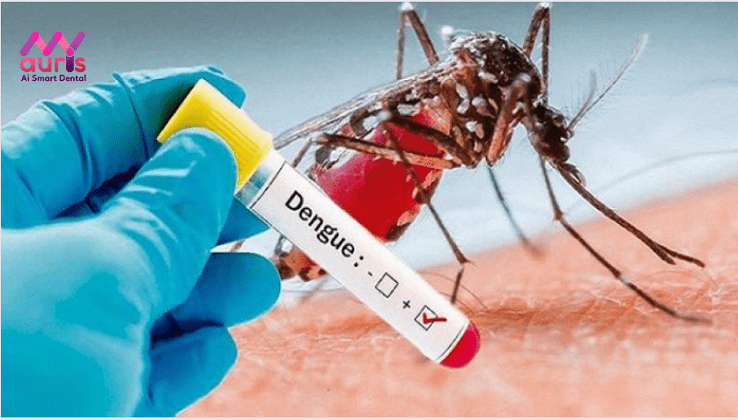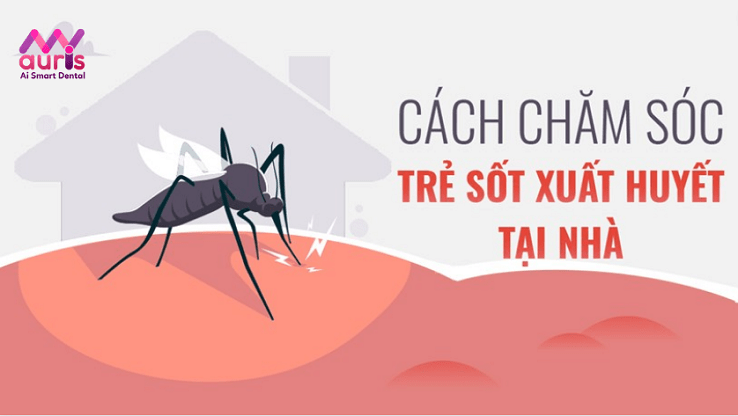Symptoms of dengue fever in adults often come with signs of high fever, rash, muscle and joint pain, nosebleeds, subcutaneous bleeding, etc. At this time, the patient needs medical intervention and treatment as soon as possible to prevent dangerous health complications. So how many stages does dengue fever go through? And how to prevent these stages? Let’s read the article below for more information about this disease!
Symptoms of dengue fever in adults
According to the World Health Organization, Dengue fever is divided into 3 levels of disease corresponding to different symptoms and levels of danger. The higher the disease level, the more likely the patient will experience serious complications and need early intervention and treatment.
Dengue fever at level 1
The incubation period when attacked by mosquitoes carrying Dengue virus in adults will be the first starting point of the disease. A typical symptom is that the patient has a sudden, continuous high fever for 2 – 7 days and is accompanied by at least 2 of the following symptoms:
- Headache, nausea and loss of appetite;
- Congested skin, rash;
- Symptoms of bleeding such as: petechiae appearing under the skin, bleeding gums, nosebleeds, etc.
- Joint pain, muscle pain and pain in both eye sockets.
With signs of high fever and the above symptoms, adults with level 1 dengue fever will make the body tired, lose strength and be unable to concentrate on work or study. Therefore, during this period, this patient needs to rest, undergo examination and treatment to alleviate symptoms.

Dengue fever at level 2
Signs of dengue fever at level 2 progress develop more severe disease. This is the warning stage due to severe symptoms and health risks.
- Extreme vomiting;
- Mucosal hemorrhage;
- Minor
- The body is tired, struggling, lethargic and mentally lethargic;
- Abdominal pain in the liver area or pain when pressed;
- Liver larger than 2cm;
Dengue fever at level 3
If the patient still has dengue symptoms as above, however, other complications also appear and progress rapidly. This can be life-threatening such as: multiple organ failure, hemorrhage, myocarditis, etc.
Warning symptoms with this level that require special attention include:
- Severe plasma leakage leads to hypovolemic shock, fluid accumulation in the pleural cavity causing difficulty breathing, etc.
- Severe bleeding, such as stomach bleeding, bleeding under the skin and bruises appearing on the body, vomiting blood, etc.
- Organ failure
As soon as there are early signs of dengue fever, adults need to go to medical facilities for treatment. If treated promptly, symptoms of the disease can be prevented from affecting health.

How to treat dengue fever?
Most adults with dengue fever can receive outpatient treatment Follow your doctor’s instructions and supervision. In severe cases, intensive hospitalization is required. Currently, there is no specific treatment for dengue fever, treatment is mainly based on symptoms and monitoring.
- Patients with high fever: treat with fever-reducing drugs. Lower body temperature by cooling the whole body with warm water, loosening clothing, etc.
- Fever-reducing medicine is usually paracetamol taken every 4-6 hours at a dose not exceeding 60 mg/kg of body weight/24 hours. Other fever-reducing drugs such as Analgin, Ibuprofen or aspirin should not be used to treat signs of fever. Because it can cause bleeding and endanger human life.
- Fluid replacement to prevent dehydration and circulatory shock for dengue fever patients with fruit juice, oresol water or clean filtered water, etc. Furthermore, in caseIn this case, the patient eats thin porridge to energize the body.
- People with dengue fever who have signs from level 2 onwards need to be hospitalized in the emergency room and treated for complications.
However, many people subjectively think that the moment the fever stops, they think the disease is cured. At this time, this is the most dangerous time, the patient can experience complications and even death. In addition, you need to pay attention to dangerous signs such as cold limbs, fatigue, bloody stools, vomiting blood, etc.
What method is used to diagnose dengue fever?
In addition to understanding the symptoms of dengue fever in adults, early diagnosis and detection are important for treatment as soon as possible. At the same time, avoid threatening human life.
In particular, Vietnam’s climate is a favorable condition for disease-causing mosquitoes, especially in the rainy season when there is high humidity. Not only that, in the early stages, the disease often has symptoms that are easily confused with the common cold. At this time, you will need to do a serum test to find viral antigens. The specific way to do this is:
- Rapid test: to find the reaction to Dengue NS1 antigen or use ELISA method to find IgG or IgM antibodies.
- PCR test to isolate the virus: Usually results will be available within 1 to 3 days with high accuracy and detects the type of virus strain causing the disease.
However, many people have the habit of being subjective, predicting the situation and buying medicine to take. This not only leaves the condition unresolved but also causes complications or affects the virus, causing it to mutate more strongly, leading to difficulty in treatment.

How to care for and monitor your health when you have dengue fever
- Pay attention to your diet. You should eat soft, easy-to-digest foods and drink plenty of water. In addition, you should not eat or drink brown or red foods because this can easily be confused with symptoms of gastrointestinal bleeding.
- According toMonitor body temperature at least 3 times a day, abdominal pain, vomiting, diarrhea, urine output in 24 hours a day,…
- Drink lots of water. Depending on the needs of each disease, you can increase fruit juices such as orange, grapefruit, lemon, coconut water, etc.
- Rest in bed, avoid stress.
- Take fever-reducing medication as prescribed by your doctor, on time as prescribed by your doctor.
Dengue fever is a condition that requires immediate emergency medical care or hospitalization for monitoring. However, there is no specific way for dengue fever in general and dengue fever signs in particular. Furthermore, monitoring the period of dengue shock from 24 to 48 hours is very important, as it can be life-threatening or even fatal. Therefore, don’t be subjective about your health!
Kim Dung





